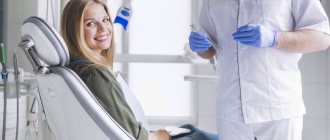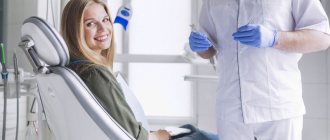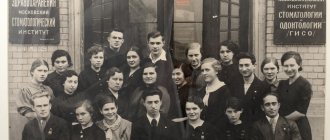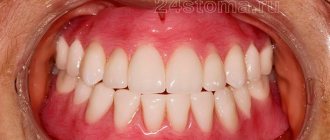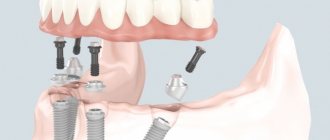Medicine consistently leads the list of “dream professions.” The most responsible school graduates strive to spend most of their lives in a white coat. Sociological studies show that a consistently high demand for medical specialties is not evident in all regions of the country. Among graduates from Moscow and St. Petersburg, for example, there are fewer people wishing to make a career in the doctoral field, while stability is observed within the professional community of doctors in these cities.
The regions are another matter: provincial youth still have a great desire to get one of the doctoral professions. And if there is a sufficient amount of knowledge for this or an emphasis is placed on paid education, then one question remains on the agenda - which university or academy to apply to.
Perhaps, initially thinking about entering a medical university, boys and girls are more obsessed with the idea of being enrolled in the 1st year. Nevertheless, the fundamental factor in evaluating an educational institution should be the quality of education. People who understand this try to enter prestigious universities - of course, Moscow and St. Petersburg. The winners of the All-Russian and International Olympiads and other “golden” contingent who have the right to enter without competition also come here.
Reference: healthcare is the only area of non-humanitarian education where the average Unified State Exam score exceeds o. In Russia, more than 75 universities of the Ministry of Health place excessive demands on the quality of basic knowledge of applicants. This indicates the undiminished prestige of the medical profession.
In the field of paid education, places were distributed as follows:
- 32 thousand applicants in 2016 preferred economic specialties;
- 20 thousand people leaned towards management;
- 15.5 thousand are future doctors.
What do medical universities look like against the background of the overall rating from Expert RA?
The application of fundamental principles of methodological research and impartiality in assessment are two good reasons to consider the ratings of medical universities RAEX (Expert RA) as one of the most reliable. The opinion about educational institutions in the healthcare sector consisted of 3 characteristics:
- quality of education;
- research work;
- demand by employers.
The group of respondents among whom the survey was conducted included graduates, students, teachers representing the scientific and academic board, and employers.
At the end of 2016, the top 100 included 16 best medical universities. As a result, the 2019 rating of medical universities in Russia based on the quality of education and other criteria is as follows:
| No. | No. in the rating | University |
| 1 | 22 | First Moscow State Medical University named after. I. M. Sechenov (First Moscow State Medical University named after I.M. Sechenov) |
| 2 | 23 | St. Petersburg State Medical University named after. Academician I.P. Pavlova (PSB State Medical University named after academician I.P. Pavlov) |
| 3 | 27 | Russian National Research Medical University named after. N. I. Pirogov (Russian National Research Medical University named after N. I. Pirogov) |
| 4 | 32 | Kazan State Medical University (KSMU). |
| 5 | 34 | Siberian State Medical University (Siberian State Medical University, Tomsk) |
| 6 | 46 | Northwestern State Medical University named after. I. I. Mechnikova (Northwestern State Medical University, St. Petersburg) |
| 7 | 49 | Voronezh State Medical Academy named after. N. N. Burdenko (VSMA). |
| 8 | 51 | Samara State Medical University (SAMMU). |
| 9 | 62 | Ural State Medical Academy |
| 10 | 70 | Omsk State Medical Academy |
| 11 | 73 | Volgograd State Medical University (Volgograd State Medical University). |
| 12 | 79 | Ryazan State Medical University named after. Academician I.P. Pavlova (Ryazan State Medical University). |
| 13 | 81 | Kursk State Medical University |
| 14 | 83 | Altai State Medical University |
| 15 | 87 | Saratov State Medical University named after V. I. Razumovsky |
| 16 | 95 | Tyumen State Medical Academy |
Judging by the results of ratings compiled by the Expert RA agency over the past 4 years, the quality of education in medical universities has improved slightly, but has improved. In 2014, for example, in the TOP-100 there were 11 institutions producing certified doctors, and 2 years later the list of leaders was replenished with four new names.
In the first “twenty” ranking of the best universities in Russia, in the compilation of which only the quality of education was taken into account, there is one institution with a meduclone - the Academy. Pavlova in St. Petersburg (17th place).
What specialties are taught in the best medical universities in the state and what is the cost of education received on a commercial basis - we present information on the first five leaders:
No. 1: First Moscow State Medical University named after I.M. Sechenov
| Specialties | general medicine, medical and preventive care, medical biochemistry, pediatrics, social work, dentistry, clinical psychology, nursing, special defectology education, management, linguistics, public health, economics, bioengineering and bioinformatics, biotechnology, medical biophysics, pharmacy |
| Average Unified State Examination score in 2016 | 142-326 (social work - dentistry); |
| Highest tuition fee (per year) | RUB 299,800 (dentistry). |
No. 2: PSPbSMU named after. acad. I.P. Pavlova
| Specialties | general medicine, pediatrics, dentistry, clinical psychology, nursing, physical education for people with health problems (correspondence courses available) |
| Average score | 237-278 (clinical psychology-medical practice), points in the specialty “nursing” were not taken into account, |
| Cost (max /year) | RUB 299,800 (special dentistry). |
No. 3: RNIMU named after. N.I. Pirogov
| Specialties | general medicine, medical biochemistry, pediatrics, social work, dentistry, clinical psychology, medical biophysics, pharmacy, medical cybernetics, biology |
| Average score | 203-283 (social work - medical biochemistry); |
| Maximum cost | 320,000 rubles/year (dentistry). |
No. 4: KSMU (Kazan)
| Specialties | general medicine, medical and preventive care, medical biochemistry, pediatrics, social work (distance learning available), dentistry, nursing, medical biophysics, pharmacy |
| Average score | 166-281 (social work - medical practice); |
| Max. price | 145,000 rub. (dentistry). |
No. 5: Siberian State Medical University (Tomsk)
| Specialties | general medicine, medical biochemistry, pediatrics, dentistry, clinical psychology, management, medical biophysics, pharmacy (full-time and part-time courses), medical cybernetics |
| Average score | 193-257 (medical biophysics - dentistry); |
| Max. price | RUB 134,900 (dentistry). |
Budget or commerce – will determine Unified State Exam scores
The points scored based on the results of the Unified State Exam are still the criterion that determines the quality of the applicant’s knowledge. The cherished numbers are taken as the very threshold value, crossing which means officially stepping outside the threshold of the chosen university on September 1st. Candidates who do not receive the required “points” will have to choose between paid education at the same institution, enrollment in another university with a more flexible points policy, or make another attempt to enroll in the “dream university”, but in a year.
The following is a list of 10 educational institutions of the Ministry of Health, which are extremely difficult to get into due to the highest passing score:
- First Moscow State Medical University named after I.M. Sechenov
- RNIMU named after. N.I. Pirogov.
- St. Petersburg State Pediatric Medical University.
- St. Petersburg State Medical University named after. Academician I.P. Pavlova
- NSMU, Novosibirsk.
- Ryaz State Medical University.
- VolgSMU.
- Siberian State Medical University (Tomsk).
- Krasnoyarsk State Medical University, Krasnoyarsk.
- Rostov State Medical University, Rostov-on-Don.
Duration of training and possible specialties
The course of basic medical education, including dental education, lasts 5 years. Then the graduate is accredited, receives the right to work independently as a therapist, and after a year of practice in a clinic, he can enter residency to master a narrower specialization:
- periodontology;
- surgery;
- orthodontics;
- orthopedics;
- children's dentistry.
After 9th grade, they study to become a dentist in medical colleges, but not in all of them. Colleges are prepared in two specialties:
- preventive dentistry (02/31/06) - these are future hygienists who provide preventive dental care and engage in professional oral hygiene;
- orthopedic dentistry (02/31/05) – these are dental technicians who make removable dentures, pin inlays, crowns, maxillofacial and orthodontic devices.
Most colleges accept only 11th grade graduates for both majors. After the 9th grade, you can only become a dental technician, and not in all educational institutions: in Moscow, for example, there are no such colleges; in St. Petersburg, the only medical college No. 3 recruits ninth-grade graduates for the specialty “orthopedic dentistry.” The duration of training on the basis of basic secondary education is 3 years 10 months. After 11th grade, study for a year less, and future hygienists complete the full course in just 1 year 10 months.
Dentists require assistants - nurses. This profession can also be obtained in medical college, including after 9th grade. Graduation from a secondary specialized educational institution and work experience in medicine open the way to admission to the Institute of Dentistry based on internal university exams, and not on the results of the Unified State Exam.
The best among paid medical universities
The highest level of education is shown by educational healthcare institutions in Moscow, St. Petersburg, Krasnodar, Kazan, Voronezh, Samara, Nizhny Novgorod, and Tver. In these cities, the medical profession is taught for a fee, and even applicants with the highest Unified State Exam scores get into “commerce.” The information was obtained as a result of monitoring conducted at the initiative of the Rossiya Segodnya International Information Agency and the National Research University Higher School of Economics.
We present the top ten universities whose paid departments are difficult to get into due to inflated competitive scores:
- PSPbSMU named after. acad. I.P. Pavlova
- VSMA named after. Burdenko.
- MGMSU named after. A.I. Evdokimov.
- KSMU.
- St. Petersburg State Pediatric Medical University.
- KubSMU, Krasnodar.
- First Moscow State Medical University named after I.M. Sechenov.
- SamSMU.
- TSMU, Tver.
- Nizhny Novgorod State Medical Academy, Nizhny Novgorod.
By tradition, the most popular specialties with corresponding competition are:
- dentistry
- medicine
- pediatrics
- pharmacy.
It is impossible to become a doctor in absentia. In Russian universities there are a number of faculties where this form of training is acceptable, but, firstly, their number is gradually reduced to zero, and secondly, they train here not future therapists and dentists, but specialists with a conditionally medical profile - for example, nursing with an emphasis on management.
Entrance exams
There is no need to take exams for medical colleges and schools: students are recruited through a certificate competition. Universities take into account the results of passing the Unified State Exam. For certain categories of applicants, dental universities organize their own entrance tests. We are talking about foreign citizens, people with disabilities, as well as graduates of technical schools, colleges and schools. If they wish, they have the right to take internal university exams without providing USE results.
The passing scores for a budget place at any dental institute are different every year and depend on how well the applicants passed the Unified State Exam and how many excellent students decide to enroll in a particular university. In the last few years the level has been high - an average of 80-90 in each subject. The competition for paid education is lower: as a rule, it is enough to score 60-65 points on the Unified State Examination. Winners of Olympiads from the List of the Ministry of Education and Science in specialized disciplines (chemistry and biology) enjoy an advantage in admission and can enter the ranks of students without competition.
How highly valued is a diploma from a Russian medical university abroad?
Today, no body in the world has the authority to award international qualifications in the field of medicine. Considering this fact, the low status of a Russian university diploma and its inconvertibility should be accepted as a false and unsubstantiated judgment. With a similar myth, earlier, in Soviet times, government officials and interested structures tried to block the road to the West for qualified specialists.
It is not entirely correct to judge the quality of education in higher education institutions, as well as the prestige of the institution itself, by the awards and regalia awarded. The most objective evaluative factor is the practicing graduates - their work, career and achievements. Maintaining a high status is possible only with a constant presence in the market and progress in all areas, including research work and cooperation with “foreign countries”.
US legislation, for example, allows the employment of doctors with university degrees registered with WHO and the IMED-FAIMER agency (a body authorized by the state). Employers should not care which institution the applicant graduated from - Harvard or State Medical University in Krasnodar. The focus is not on the place of obtaining the diploma, but on professionalism and personal abilities. If the name of the institution is not on the WHO list, you should not count on the vacancy. Specifically, the name of the medical university should be mentioned in the Avicenna catalog (contains an extensive list of educational institutions in the world working in healthcare and other areas of activity) and in the WHO WorldDirectory of Medical-Schools.
An institution for education should be chosen based on the same criteria: if its name is not listed in the WHO catalogs, it loses its attractiveness among applicants and cannot claim prestige.
Registration of medical universities with WHO is carried out on the basis of an application submitted by a government body competent in resolving such issues. In Russia, this authority is the Ministry of Health of the Russian Federation. The registration procedure itself is carried out automatically, but this process is sometimes artificially delayed for reasons known to the representatives of the international organization themselves. An example of this is the Faculty of Medicine of St. Petersburg State University: the year of its foundation is 1995, but it officially appeared on the WHO lists only in 2003, and in 2006, after a request from the administration, it was included in the IMED list.
Salaries and job prospects
Dentists have no problems finding work these days. Private dental clinics are open at every turn, and qualified specialists are needed everywhere. Many graduates also go to work in government agencies, since the level of salaries even in them is now relatively high. In the capital and large cities, dentists receive from 40 to 150 thousand rubles per month.
The prospect of a large income has always attracted future medical students to dentistry. But the desire to earn good money is not enough; the profession requires painstaking preparation. You will have to master a huge theoretical part and spend many years gaining practical skills. And only after this the dream of a big salary can become a reality.
Author: Kristina Gruzdova
